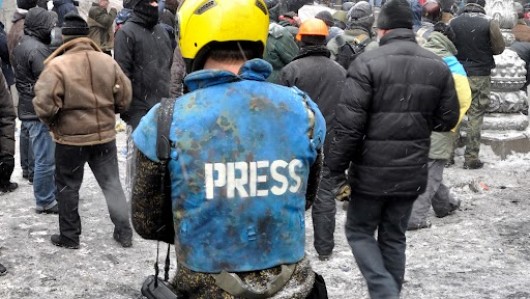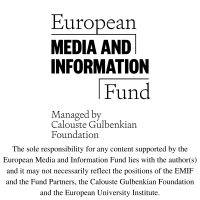On-the-ground reporting - Can it help to combat Russia’s disinformation war?
22-03-2023

WATCH THE RECORDING HERE
Russia’s war in Ukraine is notable for the extent to which it is being waged online. The war has been coined by the European Commission as “Russia’s disinformation war”. The rapid rise in internet coverage and the use of social media, a great success of digital advancement, has created an effective breeding ground for spreading disinformation and fake news on the war. According to the OECD, 75% of Ukrainians use the internet, and 89% of the population is covered by at least 3G mobile technology.
According to the European Media and Information Fund (EMIF), a possible approach to countering disinformation on the war in Ukraine is to create a network of media outlets and journalists covering the conflict on the ground and to ensure that they connect with media professionals, stakeholders and policymakers in the EU. Doing so, would support the voices of local journalists, equipping EU policymakers with more reliable information to explore the changes in geopolitical dynamics that the Russia-Ukraine conflict has brought.
Creating such a network could populate the social media environment, which has been the main hub for the diffusion of fake news, with more reliable, objective and impartial content. In strengthening collaboration between media outlets and journalists covering the conflict on the ground, action at local, regional and national levels could become more effective.
Trustworthy coverage of the consequences of the conflict on EU policy would strengthen EU-level action. The European Parliament’s Special Committee on Foreign Interference, which took place on 29 September 2022, highlighted the need to develop a more distinctive and centralised voice on Ukraine. According to the Parliament, appointing a single EU spokesperson with the sole task of communicating on the war and responding to narratives and misinformation coming out of Russia, could be a step towards combating the spread of false information on the war at an EU level.
Join this EURACTIV Virtual Conference to discuss the challenges associated with tackling disinformation in the context of the war in Ukraine. What role can media outlets and journalists play in fighting such disinformation? Could the creation of a network of on-the-ground media outlets and journalists, and the presence of a centralised EU voice, be effective approaches for countering disinformation on the war?
The sole responsibility for any content supported by the European Media and Information Fund lies with the author(s) and it may not necessarily reflect the positions of the EMIF and the Fund Partners, the Calouste Gulbenkian Foundation and the European University Institute.
WATCH THE RECORDING HERE
Supported by:

Location
Online
Panellists
Lutz Güllner, Head of Strategic Communications, European External Action Service
Ross Burley, Co-founder and Executive Director, Centre for Information Resilience
Yuliia Bankova, Editor in Chief, Liga.net
Katarina Klingova, Senior Research Fellow, Centre for Democracy & Resilience, GLOBSEC
Paolo Cesarini, Member of the Management Committee European University Institute, EMIF
Moderator
Georgi Gotev
EURACTIV
Schedule
09:30 – 09:35 Welcome
09:35 – 09:50 Panellist statements
09:50 – 10:40 Discussion and Q&A
10:40 – 10:45 Closing statements
Contact
Ana Alexandrescu
ana.alexandrescu@euractiv.com




